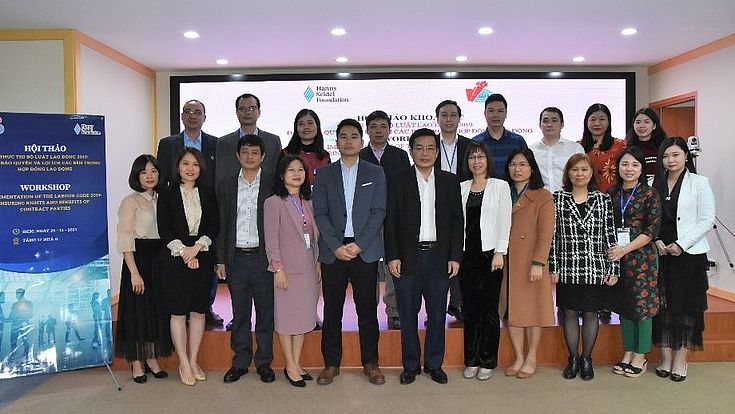Implementation of Labour Code 2019
Workshop on “Implementation of Labour Code 2019: Ensuring Rights and Benefits of Parties in Labour Contract”
Group photo of participants in the Workshop
HSF
Following the success of the first workshop in a series on "Implementation of the Labour Code 2019," HSF continued to support ULSA in organizing the second workshop, which focused on the rights and benefits of all parties in a labor contract. The Workshop welcomed the participation of 50 researchers and lecturers from various universities, policymakers from MOLISA, legal experts and representatives of businesses such as Viglacera corporation and Sunhouse group.
During the workshop, policymakers and officials from MOLISA, VCCI, and the Institute of Workers and Trade Unions explained and commented on new labor contract-related provisions such as collective bargaining, forced labor, and contract termination rights. Business representatives, on the other hand, acknowledged that the new labor law has caused challenges in their contractual processes. According to a study conducted by ULSA lecturers Dr. Vu Hong Phong and Dr. Nguyen Thi Minh Hoa, the Labour Code 2019 is an improvement that strengthens labor relations in the development of a market-oriented economy in Vietnam. Several enterprises, however, are found to be insufficiently compliant with the new labor law, blaming to financial and personnel constraints, according to the study. Pham Thi Thu Lan, Deputy Director of the Institute of Workers and Trade Unions, commented on the issue, calling for more dialogues to clarify the benefits, interests, and desires of all relevant stakeholders. Furthermore, the responsibilities and obligations of employee representative organizations, such as trade unions and women's unions, should be expanded, particularly in the contracting and collective bargaining processes.
This activity in cooperation with the ULSA is part of HSF’s efforts to fulfil our commitments to encouraging the achievement of SDG8 for decent work and economic growth in Vietnam. We look forward to further successful collaborations on this mission in the future.

